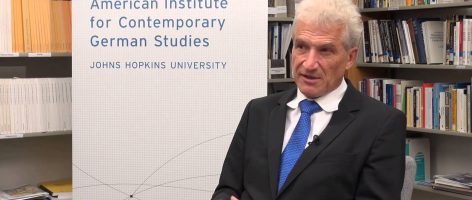Other nations could learn from Germany’s efforts to reconcile after WWII
In early March, German Chancellor Angela Merkel visited Japan, her first trip to the country in seven years. She met with Prime Minister Shinzo Abe to discuss climate change, terrorism, …
2015 Harry & Helen Gray Reconciliation Fellows Selected
AGI is pleased to announce the recipients of this year’s Harry & Helen Gray Reconciliation Fellowship, which will bring the fellows to the Institute for a stay of 6 weeks …
Dr. Lily Gardner Feldman Speaks on the Occasion of 50 Years of German-Israeli Diplomatic Relations
On May 12, 2015, Germany and Israel celebrated fifty years of diplomatic relations, an anniversary that has generated extensive reflection on this remarkable friendship seventy years after the end of …
Dr. Lily Gardner Feldman Chairs Panel on “2015 and Its Horrors”
On May 13, 2015, Dr. Lily Gardner Feldman, Harry & Helen Gray Senior Fellow and Director of the Society, Culture & Politics Program at AGI, chaired a panel on the Armenian genocide …
Macht in der Mitte: Die Neuen Aufgaben Deutschlands in Europa
In light of key challenges that lie ahead for the European Union (EU) as a political and economic entity, Germany’s role as a central power has become increasingly crucial for the cohesion of the EU. In …
Recent Authors
AGI provides knowledge, insights, and networks as tools to solve the challenges ahead.
Support Our WorkRemembering Richard von Weizsäcker
The recent death of Richard von Weizsäcker is an occasion to reflect on the role he played in shaping Germany’s ability to come to grips with its past and face …
Tri-Regional Partnering on Reconciliation in East Asia: Pivotal to Shaping the Order of the Twenty-First Century?
Policy Report 59 This Policy Report suggests a tri-regional “partnering in leadership” to assuage the tensions and lingering hostility in East Asia. Partners are necessary from the three regions involved: East …
A World in Flux: German American Relations in a Changing American Order
This year’s AGI Annual Symposium is framed around the idea of “A World in Flux”: the relative decline of the West’s economic power; the need to adapt our work forces …
Dealing with a Violent Past and Reconciliation as a Challenge for Policymakers and Civil Society Actions Experience from the Church’s Reconciliation Work between Germans and Poles
Twenty-five years after the Kohl-Mazowiecki meetings and joint mass that inaugurated “official” German-Polish reconciliation after 1989, German-Polish reconciliation is viewed as an instructive example both in Europe (Polish-Ukrainian relations) and East Asia (Japanese-Korean relations).
Regional Institution-Building in Asia: Are There Any Lessons from Europe?
For many in the international media and among casual observers of Asia, regional institution-building may appear a mundane subject. Strengthening existing regional institutions, or establishing a more substantive one, is …






